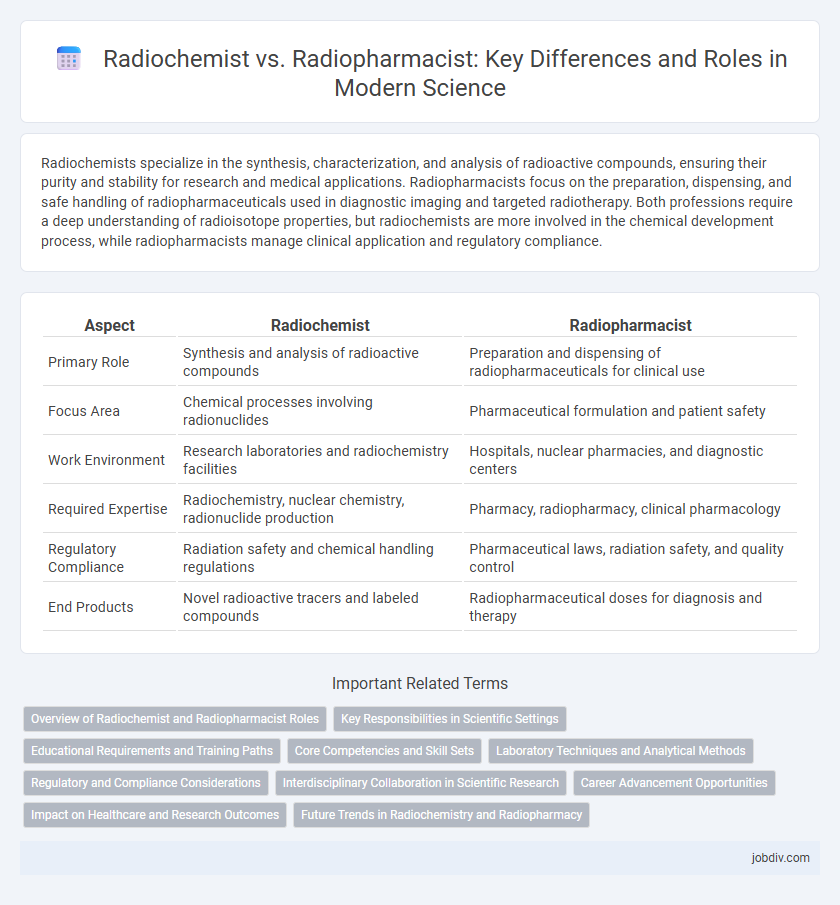Radiochemists specialize in the synthesis, characterization, and analysis of radioactive compounds, ensuring their purity and stability for research and medical applications. Radiopharmacists focus on the preparation, dispensing, and safe handling of radiopharmaceuticals used in diagnostic imaging and targeted radiotherapy. Both professions require a deep understanding of radioisotope properties, but radiochemists are more involved in the chemical development process, while radiopharmacists manage clinical application and regulatory compliance.
Table of Comparison
| Aspect | Radiochemist | Radiopharmacist |
|---|---|---|
| Primary Role | Synthesis and analysis of radioactive compounds | Preparation and dispensing of radiopharmaceuticals for clinical use |
| Focus Area | Chemical processes involving radionuclides | Pharmaceutical formulation and patient safety |
| Work Environment | Research laboratories and radiochemistry facilities | Hospitals, nuclear pharmacies, and diagnostic centers |
| Required Expertise | Radiochemistry, nuclear chemistry, radionuclide production | Pharmacy, radiopharmacy, clinical pharmacology |
| Regulatory Compliance | Radiation safety and chemical handling regulations | Pharmaceutical laws, radiation safety, and quality control |
| End Products | Novel radioactive tracers and labeled compounds | Radiopharmaceutical doses for diagnosis and therapy |
Overview of Radiochemist and Radiopharmacist Roles
Radiochemists specialize in the synthesis and analysis of radioactive compounds, focusing on their chemical properties and stability for use in medical or industrial applications. Radiopharmacists are experts in preparing and dispensing radiopharmaceuticals, ensuring accurate dosages and compliance with safety regulations for diagnostic imaging and therapeutic treatments. Both roles collaborate closely to advance nuclear medicine, with radiochemists concentrating on compound development and radiopharmacists managing clinical application and patient safety.
Key Responsibilities in Scientific Settings
Radiochemists specialize in the synthesis, labeling, and quality control of radioactive compounds, ensuring the purity and stability of radiopharmaceuticals for diagnostic or therapeutic use. Radiopharmacists focus on the preparation, dispensing, and safe handling of radiopharmaceuticals for patient administration, adhering to regulatory compliance and dose accuracy. Both roles require expertise in radiation safety, but radiochemists emphasize research and development while radiopharmacists prioritize clinical application and patient care.
Educational Requirements and Training Paths
Radiochemists typically hold advanced degrees in chemistry, radiochemistry, or nuclear science, with extensive training in radioactive material handling and radiochemical analysis techniques. Radiopharmacists require specialized education in pharmacy followed by postgraduate training in radiopharmacy, focusing on the preparation, quality control, and clinical application of radiopharmaceuticals. Both professions demand rigorous safety training due to exposure to ionizing radiation, but radiochemists emphasize chemical synthesis and analytical methods, while radiopharmacists prioritize pharmaceutical formulation and patient-centered care.
Core Competencies and Skill Sets
Radiochemists specialize in the synthesis and analysis of radioactive compounds, emphasizing expertise in radiochemical methodologies, nuclear chemistry, and quality control of isotopes. Radiopharmacists focus on the preparation, compounding, and dispensing of radiopharmaceuticals, requiring proficiency in pharmaceutical formulation, aseptic techniques, and regulatory compliance for safe handling of radiopharmaceuticals. Both professionals possess a deep understanding of radiation safety and decay kinetics but differ in practical application domains--radiochemists contribute to research and isotope production, while radiopharmacists ensure clinical-grade radiopharmaceutical availability.
Laboratory Techniques and Analytical Methods
Radiochemists specialize in synthesizing and characterizing radioactive compounds using techniques such as radiolabeling, chromatography, and nuclear magnetic resonance (NMR) spectroscopy to analyze radionuclide purity and molecular structure. Radiopharmacists focus on preparing and quality-controlling radiopharmaceuticals for clinical use, employing analytical methods like high-performance liquid chromatography (HPLC), gamma spectrometry, and sterility testing to ensure safety and efficacy. Both professionals utilize advanced laboratory techniques but differ in the scope of application, with radiochemists emphasizing compound development and radiopharmacists prioritizing pharmaceutical formulation and regulatory compliance.
Regulatory and Compliance Considerations
Radiochemists primarily focus on the synthesis and purification of radioactive compounds, adhering to strict regulatory standards set by agencies such as the Nuclear Regulatory Commission (NRC) and International Atomic Energy Agency (IAEA) to ensure safety and quality. Radiopharmacists are responsible for the preparation and dispensing of radiopharmaceuticals in clinical settings, complying with pharmaceutical regulations like the U.S. Food and Drug Administration (FDA) and Good Manufacturing Practice (GMP) guidelines to guarantee patient safety. Both professions must navigate complex regulatory frameworks involving radiation safety, labeling, and documentation to maintain compliance and minimize risks associated with radioactive materials.
Interdisciplinary Collaboration in Scientific Research
Radiochemists and radiopharmacists collaborate extensively in scientific research to enhance the development and safe application of radiopharmaceuticals. Their interdisciplinary partnership integrates expertise in nuclear chemistry, radiolabeling techniques, and pharmacokinetics to optimize diagnostic imaging and targeted therapy. This synergy accelerates innovation in radiotracer design and improves regulatory compliance, ultimately advancing personalized medicine in nuclear medicine.
Career Advancement Opportunities
Radiochemists typically advance by specializing in isotope production, radiochemical analysis, and research innovation, often securing roles in nuclear medicine or pharmaceutical development sectors. Radiopharmacists progress by gaining expertise in radiopharmaceutical formulation, regulatory compliance, and clinical applications, leading to positions in hospital radiopharmacy, quality assurance, or pharmaceutical companies. Career advancement for both professionals hinges on continuous education, certifications such as the Board of Pharmacy Specialties (BPS) or American Board of Radiology (ABR), and active participation in industry research and development projects.
Impact on Healthcare and Research Outcomes
Radiochemists contribute to healthcare by developing and optimizing radioactive compounds used in diagnostic imaging and targeted radiotherapy, enhancing the precision of cancer detection and treatment. Radiopharmacists ensure the safe preparation, quality control, and proper dispensation of radiopharmaceuticals, directly impacting patient safety and therapeutic efficacy in nuclear medicine. Both roles collaboratively advance research outcomes by facilitating the translation of novel radioactive agents from laboratory synthesis to clinical application, improving disease diagnosis and personalized treatment strategies.
Future Trends in Radiochemistry and Radiopharmacy
Emerging advancements in radiochemistry emphasize the synthesis of novel radiotracers with enhanced specificity and stability, directly impacting targeted diagnostic and therapeutic applications in nuclear medicine. Radiopharmacists are integrating automated synthesis modules and stringent regulatory frameworks to ensure the safe production and dispensing of radiopharmaceuticals, optimizing patient safety and drug efficacy. Future trends include the convergence of radiochemistry and radiopharmacy through personalized medicine approaches leveraging artificial intelligence for improved radiotracer design and individualized treatment regimens.
Radiochemist vs Radiopharmacist Infographic

 jobdiv.com
jobdiv.com